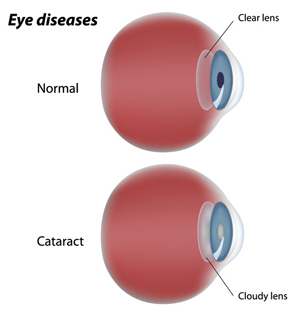What should I know about cataract surgery?
Cataracts are the clouding of the eye’s natural lenses and along with gray hair and wrinkles—cataracts are part of the inevitable aging process.
According to American Academy of Ophthalmology (AAO), close to 25.7 million Americans over age 40 have cataracts and the number is projected to increase to 45.6 million by 2050. In fact, cataract surgery, is the most common elective surgical procedure among patients over the age of 65 in North America.
Better & Safer Living
Many studies have found that cataract surgery can improve the quality of life, reduce the risk of falling ¹ and fewer car crashes ². In addition, one study found that those who had cataract surgery had a 40 percent lower long-term mortality risk than those who did not ³.
How should I know when to have cataract surgery?
If you’ve been told that you have cataracts you may not need surgery immediately. But over time your cataracts will cause loss of vision. The decision for cataract surgery is based on when your vision difficulties start to interfere with your normal activities, like driving, reading, work, or hobbies.
Symptoms of cataracts include dim, blurry or yellowed vision. Poor vision due to cataracts can be a serious health risk.
Is cataract surgery performed in a hospital or in an ambulatory surgery center?
The majority of our patients have their cataract surgery performed as an outpatient procedure at the Albany Regional Eye Surgery Center in Latham, New York. The staff at our surgery center exclusively performs eye surgery and they are highly experienced in helping patients comfortably go through all the steps of their surgery.
How long does the cataract surgery take?
Cataract surgery takes about ten minutes in the operating room. Most people are in our surgery center for about 90 minutes, including pre- and post-operative time.
Is cataract surgery performed under a general anesthesia?
Cataract surgery is routinely performed with local anesthesia. We provide intravenous medications to help patients fully relax. We also administer local medicines around the eye so patients don’t feel or see anything during surgery. A small number of patients may require general anesthesia and/or the surgery to be performed at a hospital operating room due to other medical conditions.
What are Premium Intraocular Lenses (IOLs)?
Premium IOL implants refer to a category of lens implants determined by the Centers for Medicare and Medicaid Services (CMS) as new technology Intraocular Lenses (NTIOLs). Medicare does not cover the cost of premium IOLs. However, they do allow members to pay for the new technology lenses when they have their cataract surgery.
If you are considering a premium IOL it is important to work with a cataract surgeon that has experience in implanting these specials lenses.
What types of FDA Approved Premium IOLs are there?
There are several types of premium IOLs including multifocal, accommodative and toric.
A multifocal IOL has several rings of different powers built into the lens. The part of the lens (ring) you look through will determine if you see clearly at a far, near, or intermediate distance.
An accommodative IOL is hinged to work in coordination with the eye muscles. The design allows the accommodative lens to move forward as the eye focuses on near objects, and move backward as it focuses on distant objects.
Toric IOLs designed to correct astigmatism are also considered “premium” lenses.
Next Steps
There’s more to having cataract surgery than just getting rid of the cataract. Equally important is the goal of maximizing the quality of your vision. With cataract surgery, making sure you make the right choice for your vision and lifestyle includes understanding ALL your options for FDA approved intraocular lenses (IOLs), such as monofocal, multi-focal, accommodating and toric.
Prior to having cataract surgery, make an appointment with us. We will provide you with a custom treatment plan for achieving your personal best vision. Our surgeons are very experienced at implanting all types of IOLs, so you don’t have to compromise.
Your vision isn’t like anyone else’s— and neither should your cataract treatment be.
¹ http://www.ncbi.nlm.nih.gov/pubmed/22851116
² http://www.ncbi.nlm.nih.gov/pubmed/22273356
³ http://www.aaojournal.org/article/S0161-64201300143-7/fulltext


